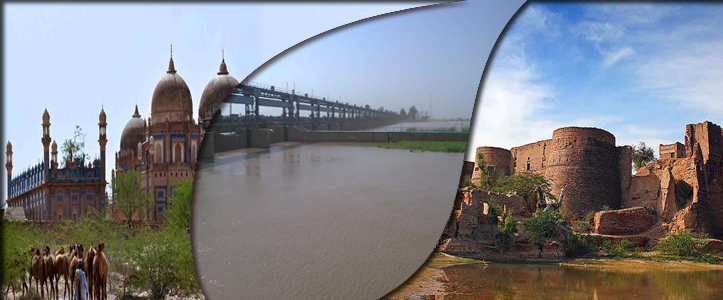The dying civilisation of
River Sutlej

According to surveys and
reports of international institutions, the underground water
in this entire region has already reached a level of
contamination and is not fit for consumption by human beings
or livestock. The problem is that seasonal rains, the other
natural source to recharge the underground water level, has
a very low percentage in the region an average of two
inches compared to 15 inches in the Ravi region.
In the context of this
natural climate condition, special plans were needed to
manage water accessibility for the people of the region.
This situation reflects the apathy of those in government
who are not ready to pay heed to the misery and death faced
by the people of the Bahawalpur region.
Bahawalpur was never a barren state. In 1892 the state of
Bahawalpur had 43 major and medium canals with a total
length of 1600km with a mere population of 6.5 lacs.
Later on, Bahawalpur
initiated the Sutlej Valley Project consisting of modern
canal systems designed and built in the 1920s in order to
cater to the needs of the region including the desert.
Under this project, three headworks were constructed on
River Sutlej Panjnad Headworks, Sulemanki Headworks and
Islam Headworks.
Out of these headworks, a
6000km-long canal network was constructed to irrigate
millions of acres of land.
Out of these canals, Canal
Sadqia and Fordwa were carved out from Head Sulemanki and
dedicated to the eastern region of the Bahawalpur.
From Head Islam, Bahawal
Canal and Qaimpur Canal were created which were dedicated to
the needs of the central region of the state.
Abbasia Canal and Panjnad
Canal were carved out of Head Panjnad to irrigate the
remaining areas of Bahawalpur.
This Sutlej Valley Project brought a green revolution to the
Bahawalpur area.
But all this hard work went
down the drain due to the criminal negligence of successive
governments who paid no heed to constructing the Trimu link
canal which was supposed to bring 20,000 cusec water to Head
Islam.
Today, the canals of Cholistan built under the Sutlej Valley
Project are filled with sand while the bridges reflect the
ruins of old glory.
In the Bahawalpur region,
Cholistan consists of 64 lac acres of land which today is
nothing but a barren desert without a drop of water.
So Pakistan has a region
where humans and animals drink unhygienic and adulterated
water from the same pond in Cholistan. Whenever rains dont
refill such ponds, the inhabitants of Cholistan have no
other option but to migrate to other places along with their
livestock or wait for imminent death.
On the contrary, on the other
side of border, the Rajasthan desert, adjacent to Cholistan,
presents a very different picture. With cultivated fields,
livestock, woollen mills, tourism resorts and furnished
hotels, Rajasthan is a prosperous area.
India has built the Indira
Gandhi Canal with a capacity of 19000 cusecs along the
border which is irrigating the entire Rajasthan region,
making the population of the bordering areas a part of
national economic growth.
If properly looked after, Cholistan has the capability to
become a food basket for all of Pakistan as is the case in
Rajasthan.
Moreover, Bahawalpur and Cholistan have crucial importance
in the defence strategy of Pakistan.
All our communication and
transportation linkages pass through this thin territory
that connects both the north and south of the country.
It is also important to note that all over the world, people
and installations in bordering regions prove to be the
natural sources of the first line of defence for any
country.
So governments lay more focus
on the wellbeing and development of the bordering regions to
ensure that no neighbouring country can take advantage of
the poverty or backwardness of the people of such sensitive
areas.
It is important in this context that more dedicated effort
is carried out to ensure the growth and prosperity of the
Bahawalpur region, which we we ignored entirely making the
defence of Pakistan a lesser priority.
It is the prime responsibility of the government of Pakistan
to build the Trimu-Islam link canal to prevent further
damage to the life, environment, livestock, agriculture and
general economy of the Bahawalpur region.
The canal system of the
region should be revived to cultivate Cholistan.
Similarly, the government of Pakistan should take up with
the government of India the issue of the essential minimum
level of water in River Sutlej from the Ferozepur Headworks
onward on humanitarian grounds.
Pakistan should also utilise its diplomatic influence on
India to have all the guarantees made in the Indus Basin
Water Treaty implemented to help save the damage to the 25
million people living in six districts on both sides of the
Sutlej river from the Sulemanki Headworks to Panjnad.
Today the 300kms long river belt of River Sutlej is nothing
but a barren and dry desert where people and cattle are
forced to drink black water to survive.
The poor people of the area
are left to suffer, which continues unabated due to the
economic deprivation they are faced with.
June, 2015
By: Muhammad Ali Durrani
Source: The
News